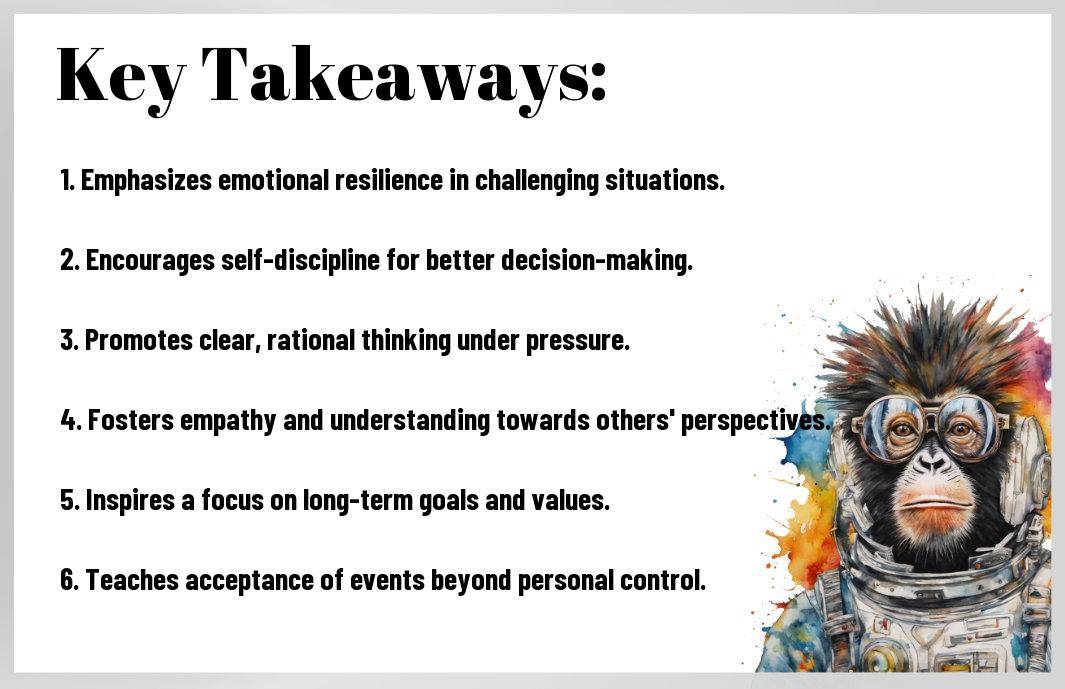There’s something truly powerful about adopting Stoicism in our journey toward becoming great leaders. In this post, I’ll share how Stoic principles can transform the way you approach challenges, make decisions, and interact with others. By embracing a mindset grounded in resilience, self-control, and wisdom, you’ll find that your leadership skills can flourish, even in the toughest of times. Let’s explore together how these ancient teachings can guide you on your path to inspiring others and creating a lasting impact.
Key Takeaways:
- Emotional Resilience: Stoicism teaches leaders to manage their emotions, enabling them to remain calm and composed in challenging situations.
- Focus on What You Can Control: By concentrating on their own actions and decisions, leaders can navigate obstacles more effectively without being hindered by external factors.
- Practice of Virtue: Stoic principles encourage leaders to cultivate virtues such as wisdom, courage, and justice, which guide them in making ethical decisions.
- Perspective Expansion: Stoics suggest viewing challenges as opportunities for growth, allowing leaders to adopt a positive mindset even in adversity.
- Mindfulness and Reflection: Regular introspection helps leaders develop self-awareness and learn from their experiences, fostering continual improvement.
- Community and Responsibility: Stoicism emphasizes the importance of serving others and contributing positively to society, which inspires leadership rooted in purpose.
- Emphasis on Rational Decision-Making: Leaders practicing Stoicism prioritize logic and reason over impulsive reactions, leading to more effective and thoughtful strategies.

Understanding Stoicism
While many philosophies promise to help us navigate life’s challenges, Stoicism offers a unique approach that resonates deeply with me. This ancient practice encourages us to adopt a mindset based on virtue, self-control, and rationality. It teaches us to focus on what we can control while accepting what we cannot. This acceptance breeds a sense of inner peace that is invaluable for anyone in a leadership position. When you’re a leader, having this calmness allows you to make more informed decisions, even in the face of adversity.
The Core Principles of Stoicism
After venturing into Stoicism, I found that its core principles revolve around wisdom, courage, justice, and temperance. Wisdom allows us to discern between what is helpful and unhelpful in our lives, while courage empowers us to face challenges head-on. Justice emphasizes treating others fairly and being mindful of ethical considerations in our actions, and temperance teaches moderation in all things. All these principles work together harmoniously, paving the way for not just personal growth but also great leadership.
How Stoicism Differs from Other Philosophies
Any discussion about Stoicism would be incomplete without highlighting how it sets itself apart from other philosophies. Unlike some schools of thought that romanticize emotional expression, Stoicism emphasizes the importance of rational thought and emotional resilience. Instead of being swept away by feelings, Stoics encourage us to observe our emotions, understand them, and then choose our responses wisely. This practical and disciplined approach to life’s challenges can be particularly beneficial when guiding a team or organization.
Even in comparison to more modern philosophies, Stoicism’s focus on self-mastery and ethical behavior stands out. Many contemporary philosophies emphasize personal fulfillment and happiness, but Stoicism asks us to look beyond our immediate desires. It invites us to cultivate a sense of purpose and to act in ways that contribute positively to the greater good. This results in a more sustainable and impactful leadership style, fostering a culture of resilience, accountability, and integrity in the workplace.

Stoicism in Leadership
Any leader knows that the journey is often filled with challenges, uncertainty, and scores of decision points that can significantly alter the course of their teams or organizations. This is where Stoicism can be incredibly beneficial. By embracing a Stoic mindset, I can approach decision-making with clarity and confidence, focusing only on those elements within my control. When faced with complex choices, I practice separating my emotions from the objective situation, allowing for more rational outcomes that benefit not only myself but also my team. This clear-headed approach helps build trust, as my decisions become more consistent and reliable.
The Stoic Mindset for Decision-Making
Among the various philosophies out there, Stoicism stands out for its practical tools for navigating the often-choppy waters of leadership. By adopting the Stoic mindset, I can keep my focus on long-term goals rather than getting bogged down by momentary setbacks or emotional upheaval. This encourages a culture where rational thinking prevails, enabling my team and I to make informed decisions rather than reactive ones. In essence, it transforms decision-making from a stressful chore into a reasoned process, paving the way for strategic thinking.
Building Resilience as a Leader
For me, resilience is the backbone of effective leadership. Stoicism teaches us that adversity is part of the journey, and it’s how I respond to challenges that will define my effectiveness as a leader. When faced with difficulties, I draw from Stoic principles, accepting what I cannot change while actively working on what I can influence. This mindset not only fosters my inner strength but also inspires my team to cultivate their own resilience, creating a supportive environment that thrives even when the going gets tough.
Understanding that setbacks are not failures but rather opportunities for growth allows me to maintain my composure under pressure. I can reflect on challenges and extract valuable lessons to improve my leadership style. By promoting this outlook within my team, we create a collective ethos of perseverance, turning obstacles into stepping stones rather than roadblocks. This organic resilience becomes a defining characteristic of our work culture, enabling us to face future challenges with optimism and determination.
Emotional Intelligence through Stoicism
Your journey to becoming a great leader can greatly benefit from understanding and applying the principles of Stoicism to enhance your emotional intelligence. By adopting a Stoic mindset, you naturally cultivate better management of your emotions, leading to clearer thinking and more effective decision-making. One important aspect is recognizing that while we cannot control the events around us, we can control how we respond to them. This empowers you to remain calm under pressure, allowing for more rational and thoughtful responses rather than reactive ones. When you practice detachment from your emotional responses, you open the door to clearer perspectives that enrich not only your own experience but also those of your team.
Managing Emotions Effectively
Emotions are a natural part of being human, and acknowledging them is important for effective leadership. While Stoicism teaches us to control our emotional responses, it doesn’t mean suppressing them entirely. In my personal experience, managing emotions effectively involves recognizing them, understanding their triggers, and learning how to express them constructively. I often find that taking a moment to pause and reflect on what I’m feeling allows me to respond with intention rather than instinct. This method not only enhances my decision-making but also sets an example for my team, creating a culture of emotional awareness and responsibility.
Empathy and Understanding in Leadership
Among the most significant benefits of Stoicism is its ability to enhance empathy and understanding in leadership. When I embrace the Stoic principle of viewing situations from multiple perspectives, I gain a deeper understanding of my team members’ feelings and needs. This mindful approach allows me to connect with others on a human level, creating a sense of trust and open communication. As a leader, when you take the time to listen and empathize, you not only build stronger relationships but also foster an environment where everyone feels valued and heard.
Emotional intelligence isn’t just about managing your own feelings; it’s also about recognizing and responding to the emotions of those around you. By practicing empathy and understanding, I can better support my team in tackling challenges. This doesn’t mean taking on their emotions or trying to solve every problem for them, but rather being present and validating their experiences. When leaders show they care and understand, it strengthens the team’s bond and ultimately cultivates a more productive and positive work atmosphere.
Leading by Example
Keep in mind that as a leader, your actions often speak louder than words. This principle is at the heart of Stoicism, which emphasizes living in accordance with your values. When you exhibit integrity in your decisions and interactions, you set a powerful example for your team. By aligning your words and actions, you build a foundation of trust and respect. This not only enhances your credibility but also fosters an environment where your team feels empowered to uphold similar values.
The Power of Integrity
An crucial aspect of great leadership is integrity. It’s about being honest with yourself and others, making decisions based on what is right, rather than what is easy or convenient. When I lead with integrity, I show my team that I am committed to our shared mission and values. This authenticity resonates with others and creates an atmosphere where everyone feels valued and aligned toward our common goals.
Inspiring Trust and Loyalty
Any leader who wishes to inspire trust and loyalty must first demonstrate that they can be counted on. By being consistent in my actions and decisions, I cultivate an environment of reliability. My team can feel confident that I will follow through on commitments, fostering a sense of safety and loyalty among them. This is vital in building strong team dynamics, where each member feels respected and understood in their role.
This trust creates a cycle of loyalty; when I am trustworthy, my team is more likely to go above and beyond, supporting one another and achieving collective goals. In my experience, leading by example with integrity not only strengthens the bond with my team but also encourages them to embody these traits as well. The result is a collaborative workspace where trust flourishes, leading to greater productivity and satisfaction for everyone involved.
Practical Applications of Stoicism for Leaders
Many great leaders have turned to Stoicism as a guiding philosophy, finding that its principles offer invaluable tools for effective leadership. The beauty of Stoicism lies in its practicality; it encourages introspection and helps us navigate the complexity of leadership challenges with clarity and composure. As I explore these applications, I find that Stoicism not only helps refine my decision-making, but also equips me to inspire resilience in those I lead.
Daily Stoic Practices
At the heart of applying Stoicism in my daily routine are simple yet impactful practices. Each morning, I take a moment to set my intentions, reflecting on what I can control and what I must let go. I recall the teachings of thinkers like Marcus Aurelius, allowing their wisdom to frame my mindset as I prepare for the day ahead. This reflection keeps me grounded when unexpected challenges arise, reminding me to focus on my actions and reactions rather than external events outside my influence.
Additionally, in the evenings, I engage in a practice of reviewing my day. I ask myself what went well and what I could improve upon. This nightly reflection helps reinforce my commitment to growth and cultivates an attitude of gratitude, fostering a sense of peace as I acknowledge my progress and setbacks alike.
Integrating Stoicism into Leadership Styles
Before diving deeper into integrating Stoicism into my leadership style, I recognize the significance of aligning my approach with its core principles. I strive to embody virtues such as wisdom, courage, and temperance, allowing these values to guide my interactions and decisions. By doing so, I aspire to create an environment where my team feels empowered to accept challenges with resilience and meet adversity with a stable mindset.
For instance, I place a strong emphasis on open communication and transparency, mirroring the Stoic belief in honesty and integrity. This openness encourages my team members to share their thoughts and emotions, fostering trust. When faced with challenges, I remind my team to focus on what we can control and to let go of distractions. By integrating these Stoic principles into my leadership style, I not only enhance my effectiveness as a leader, but also inspire a culture of resilience and growth within my team.

Real-Life Examples of Stoic Leaders
Historical Figures
Historical figures like Marcus Aurelius and Seneca serve as outstanding examples of Stoic leadership throughout the ages. When I look at Marcus Aurelius, the Roman Emperor, I can’t help but admire his commitment to duty and moral integrity. His work, “Meditations,” is like a treasure trove of Stoic wisdom, guiding not only himself but also countless others in leadership roles. You can see how he approached challenges with grace and perseverance, always focusing on what was within his control and looking out for the well-being of his subjects.
Modern-Day Leaders
Stoic principles are not confined to the history books; they echo in the lives of many modern-day leaders as well. Take someone like George Washington, whose steady resolve and visionary leadership during the American Revolution embody key Stoic ideals. When I think about how he maintained composure in the face of adversity, I feel inspired to adopt a similar mindset in my own challenges. Leaders like him show us that embracing Stoicism can lead to effective decision-making and a sense of purpose in guiding others.
In addition, contemporary figures such as Tim Ferriss and Ryan Holiday have embraced Stoicism in their leadership styles. Their advocacy for practicing gratitude and mindfulness helps create a positive culture in their workspaces. I find their approaches refreshing and relatable, as they demonstrate how Stoic principles can lead to not just personal resilience, but also effective teamwork and collaboration. By learning from these leaders, I can cultivate a mindset focused on strength, wisdom, and purpose in my own endeavors.
Final Words
On the whole, I believe that Stoicism can truly shape us into great leaders. By fostering qualities like resilience, rationality, and emotional control, it empowers us to navigate the storms of leadership with grace and confidence. When we practice these principles, we not only improve our own decision-making but also inspire those around us to strive for excellence. I find that embracing a Stoic mindset allows me to approach challenges with a calm demeanor and fosters an atmosphere of trust and respect among my team members.
As I reflect on the insights gleaned from Stoicism, I often ponder whether do Stoics make good leaders? : r/Stoicism, and I find that the answer is a resounding yes. Stoic teachings remind me to focus on what I can control, letting go of the aspects beyond my influence. This mental clarity helps me to communicate effectively and lead with integrity. I encourage you to explore the principles of Stoicism and discover how they can transform your leadership journey, just as they have transformed mine.
FAQ
Q: What is Stoicism and how does it relate to leadership?
A: Stoicism is an ancient Greek philosophy that teaches the development of self-control and fortitude as a means to overcome destructive emotions. In leadership, Stoicism helps individuals maintain composure and make rational decisions, fostering a more stable and effective environment for their teams.
Q: How can Stoicism improve decision-making in leaders?
A: Stoicism encourages leaders to approach decisions with a clear mind, focusing on reason and logic rather than being swayed by emotions. This perspective allows leaders to evaluate situations objectively, considering the long-term consequences of their decisions for both their teams and the organization.
Q: In what ways does Stoicism promote resilience in leadership?
A: Leaders practicing Stoicism learn to view challenges and setbacks as opportunities for growth. By accepting the reality of difficult situations and maintaining a focus on what is within their control, these leaders can cultivate resilience, inspiring their teams to persevere through adversity.
Q: How does Stoicism affect a leader’s ability to manage stress?
A: Stoicism equips leaders with techniques to manage stress by emphasizing the importance of focusing on the present moment and what they can control. This mindset helps leaders navigate stressful situations with a sense of calm and clarity, preventing burnout and promoting well-being within their teams.
Q: What role does empathy play in Stoic leadership?
A: While Stoicism is often associated with rationality, it also fosters a deep understanding of human emotions. Stoic leaders practice empathy by acknowledging the feelings of their team members, which allows them to create a supportive environment where individuals feel valued and understood, enhancing overall team cohesion and morale.
Q: Can Stoic principles be applied to team dynamics?
A: Absolutely. Stoicism encourages leaders to build a culture of mutual respect and accountability within teams. By modeling Stoic principles such as fairness, open-mindedness, and self-discipline, leaders can inspire their teams to adopt similar values, leading to improved collaboration and effectiveness.
Q: How can one start incorporating Stoicism into their leadership style?
A: Leaders can begin by familiarizing themselves with Stoic literature, such as works by Marcus Aurelius and Seneca. Practicing mindfulness and reflection, applying Stoic techniques to daily challenges, and engaging in discussions with others about Stoic principles can facilitate a gradual integration of these practices into one’s leadership style.

